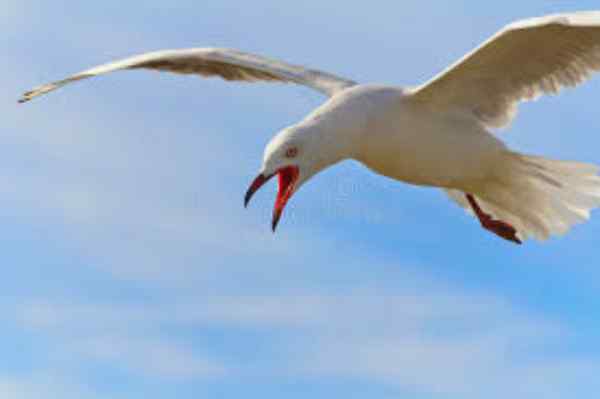Seagulls are a peculiar yet fascinating species of birds. Often seen rummaging through bins or boldly snatching snacks from unsuspecting humans, these creatures can be quite a nuisance. Despite their troublesome nature, however, seagulls possess remarkable qualities that warrant admiration.
Table of Contents
Known for their intelligence and adaptability, they can soar through the skies with grace and power. Before considering adopting a seagull as a pet, it is important to understand that, like all wild animals, they are protected by laws that prohibit capturing or keeping them as pets.
While they may seem like an intriguing companion, it is best to appreciate these wondrous birds from a distance.

Reasons Why Seagulls Make Good Pets
As our urban environments continue to expand and develop, we are seeing more and more seagulls making their homes close to humans. While it may seem unusual, it makes sense when we consider the scarcity of fish stocks and seafood.
The easy pickings of household garbage and litter make urban spaces a more attractive option for these birds to rear their young ones. However, as enjoyable as it may be to observe these creatures up close, it is important to remember that adopting a seagull as a pet is not allowed.
While we may have good intentions to help a bird in need, seagulls are wild animals that need to remain in their natural habitat. As fascinating as urban seagulls may be, it is important to respect their natural instincts and give them the space they need to thrive.
Adaptability
Seagulls are incredibly adaptable creatures. They have a wide range of habitat preferences and can thrive in various environments. When it comes to their diet, they are not at all selective and will consume almost anything that they consider edible.
Similar to most animals, seagulls seek warmth, access to water, and abundant food sources. As omnivores, they can eat the same food that humans consume. You needn’t worry about providing a specific diet to prevent malnourishment; seagulls are content with a combination of aquatic life and carrion, which can be occasionally offered to them.

It’s worth noting that seagulls have relatively weak legs since they are naturally adapted for swimming rather than walking or scavenging in public parks. To cater to their needs, providing a pool or water source in your backyard where they can swim would be a fantastic idea.
Intelligence
Seagulls are, without a doubt, among the most intelligent creatures under the sun. Their ability to learn, master, and remember behaviours is nothing short of exceptional. In fact, various research studies have shown that they are capable of passing on such behaviours to others within their flock.
What’s more, they have a remarkable ability to read human cues, which is why a simple gaze is often enough to keep them at bay. If that’s not an indication of their cleverness, then I don’t know what is! In any case, it’s hard not to be in awe of these fascinating birds and their remarkable cognitive capabilities.
Seagulls Can Remember You
Seagulls are fascinating creatures with unique behaviours that captivate our attention. Among their most captivating behaviours are their impressive acrobatics and noisy squabbles. While these squabbles can be seen as annoying to some, they are, in fact, an integral part of the seagulls’ communication codes.
These codes guide their interactions and help them to communicate with one another effectively. If you’re interested in learning how to communicate with these intelligent birds, you may want to consider keeping them as pets. By doing so, you’ll be able to develop a unique method of communication that the birds will learn to remember you by.

Seagulls Are Social
Seagulls may seem like just birds who fly around beaches and piers, but in reality, they have complex social lives. These birds live in communities and interact with each other in ways that closely resemble human society. Although they may squabble and fight over resources like food and nesting sites, they also show an incredible level of socialization.
Adult seagulls sometimes venture away from their nests and spend time with other seagulls, akin to a social outing for us humans. It’s interesting to note that while they may get lost during their travels, most seagulls do eventually find their way back home.
Reasons Why Seagulls Don’t Make Good Pets
The mixed sentiments of love and hate towards seagulls are well-known, but the question remains: can seagulls truly be considered good pets? Although there have been a few individuals who have attempted to keep seagulls as pets and achieved success, the majority have faced challenges and ultimately failed. Let’s explore the reasons behind this.

Seagulls Are Messy
For some, seagulls are a beautiful sight at the beach or near the harbour. They soar gracefully in the air, their white wings catching the sunlight and their distinct call echoing through the air. However, these creatures are far from peaceful.
They might look pretty, but they are known for their messiness, noisiness, and aggressiveness, especially when they are hungry. Don’t be surprised if you find them fighting over scraps of food, ignoring the humans around them. They are determined scavengers, not easily deterred.
Seagulls Are Not as Friendly
While these birds have a reputation for snatching food and tampering with everything in their path, there’s more to them than meets the eye. Many people hate seagulls for being “thieves,” but if you take the time to get to know them, you might find that they can be quite friendly.
Of course, getting too close to a seagull can also trigger a negative response, such as biting, so it’s important to approach these birds with caution and patience.

Seagulls Are Challenging to Tame
Seagulls are notorious scavengers, and it’s not difficult to attract their attention with a bit of food. However, aspiring pet owners should think twice before bringing one of these birds into their homes.
Seagulls require a vast amount of space to thrive and can become easily bored, leading them to search for greener pastures if their needs are not met. Despite their reputation as opportunistic feeders, seagulls are complex creatures with complex needs.
Seagulls Are Protected Animals
Birds are fascinating creatures to observe, but it’s important to remember that they are considered wild animals and are protected by many governments. In fact, it is illegal to intentionally capture them, disturb them or harm them in any way.
Even seagulls, which cannot be kept as pets in some countries, are not exempt from care and protection when they are vulnerable. If you want to enjoy the beauty of these magnificent creatures, it’s important to obtain special authorization from the authorities to keep them close by.
What Else Do I Need to Know About Pet Seagulls?
Seagulls are not only protected in Europe and the United States but also in several other countries including Canada, Russia, Mexico, and Japan. These countries have laws in place to safeguard migratory birds, making it illegal to sell, transport, capture, kill, or harm seagulls.
While there are limited circumstances in which seagulls may be culled, these birds have adapted to living alongside humans and often scavenge for food in heavily polluted areas such as garbage dumps, landfills, and residential trash bins. As a result, they can potentially spread harmful bacteria and fungal agents, posing significant health risks.
The impact of seagulls is not limited to humans alone. The uric acid found in their droppings can cause corrosion and structural damage to buildings, leading to additional concerns.
Furthermore, seagulls pose a serious security threat to air traffic. Their presence can potentially endanger low-flying aircraft. Therefore, if you reside near areas with frequent air traffic, this is an important factor to consider before considering adopting a seagull as a pet.
Reference:
- https://www.haringey.gov.uk/sites/haringeygovuk/files/seagulls_information_leaflet.pdf
- https://bird-x.com/blog/seagulls-the-most-intelligent-and-resourceful-seabird-and-pest-bird/
- https://www.mass.gov/doc/do-not-feed-the-gulls-brochure-0/download

Zahra Makda
Growing up enjoying the beauty of my village, a good passion for nature developed in me from childhood. Following my passion for the natural world, I have chosen zoology for my graduation, during my undergraduate degree, I participated in many nature trails, bird watching, rescues, training for wildlife conservation, workshop, and seminars on biodiversity. I have a keen interest in invertebrate biology, herpetology, and ornithology. Primary interests include studies on taxonomy, ecology, habitat and behavior.









